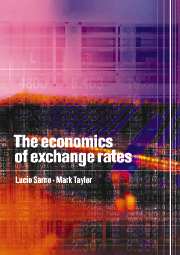Book contents
- Frontmatter
- Contents
- Foreword by Jeffrey A. Frankel
- Preface
- 1 Introduction
- 2 Foreign exchange market efficiency
- 3 Purchasing power parity and the real exchange rate
- 4 Exchange rate determination: theories and evidence
- 5 New open-economy macroeconomics
- 6 Currency unions, pegged exchange rates and target zone models
- 7 Official intervention in the foreign exchange market
- 8 Models of currency crisis and speculative attack
- 9 Foreign exchange market microstructure
- Author index
- Subject index
1 - Introduction
Published online by Cambridge University Press: 05 September 2012
- Frontmatter
- Contents
- Foreword by Jeffrey A. Frankel
- Preface
- 1 Introduction
- 2 Foreign exchange market efficiency
- 3 Purchasing power parity and the real exchange rate
- 4 Exchange rate determination: theories and evidence
- 5 New open-economy macroeconomics
- 6 Currency unions, pegged exchange rates and target zone models
- 7 Official intervention in the foreign exchange market
- 8 Models of currency crisis and speculative attack
- 9 Foreign exchange market microstructure
- Author index
- Subject index
Summary
In the last few decades or so exchange rate economics has seen a number of important developments, with substantial contributions to both the theory and the empirics of exchange rate determination. Important developments in econometrics and the increasing availability of high-quality data have also been responsible for stimulating the large amount of empirical work on exchange rates published over this period. Nevertheless, while our understanding of exchange rates has significantly improved, a number of challenges and open questions remain in the exchange rate debate, further enhanced by important events in this context such as the launch of the euro as the single European currency in January 1999 and the large number of currency crises which occurred during the 1990s.
In this book – part monograph, part advanced textbook – we provide a selective coverage of the literature on exchange rate economics, focusing particularly but not exclusively on contributions made during the last fifteen years or so. Throughout the book our aim is, in addition to giving a clear exposition, to provide constructive criticism of the literature and to suggest further avenues for research and analysis. The survey article by Taylor (1995) on ‘The Economics of Exchange Rates’, which provides a comprehensive review of the post-war literature on the subject until the early 1990s, may be seen as useful groundwork preliminary to the study of this book, although readers with a good general background in economics should be able to tackle the book head on.
- Type
- Chapter
- Information
- The Economics of Exchange Rates , pp. 1 - 4Publisher: Cambridge University PressPrint publication year: 2003



